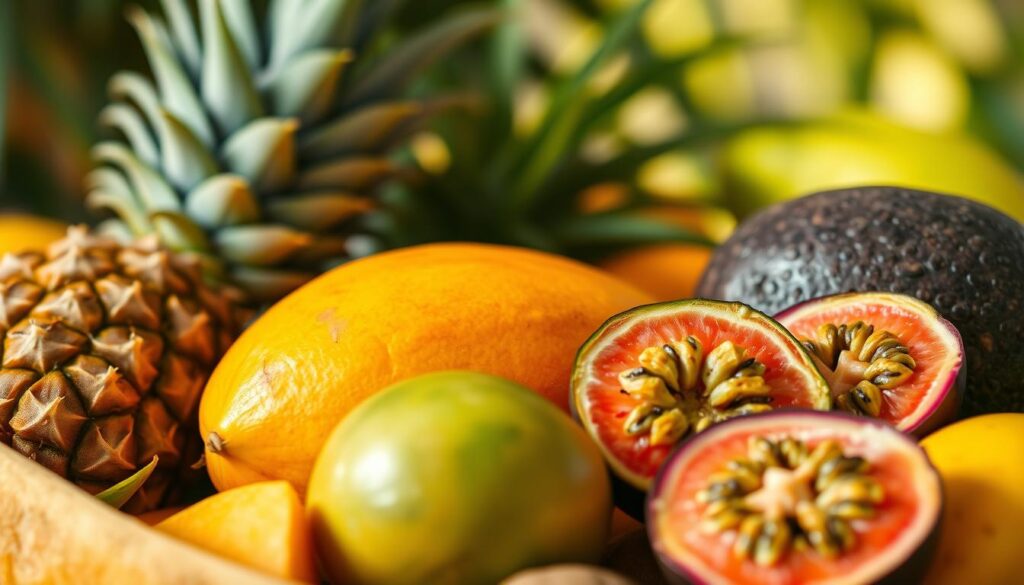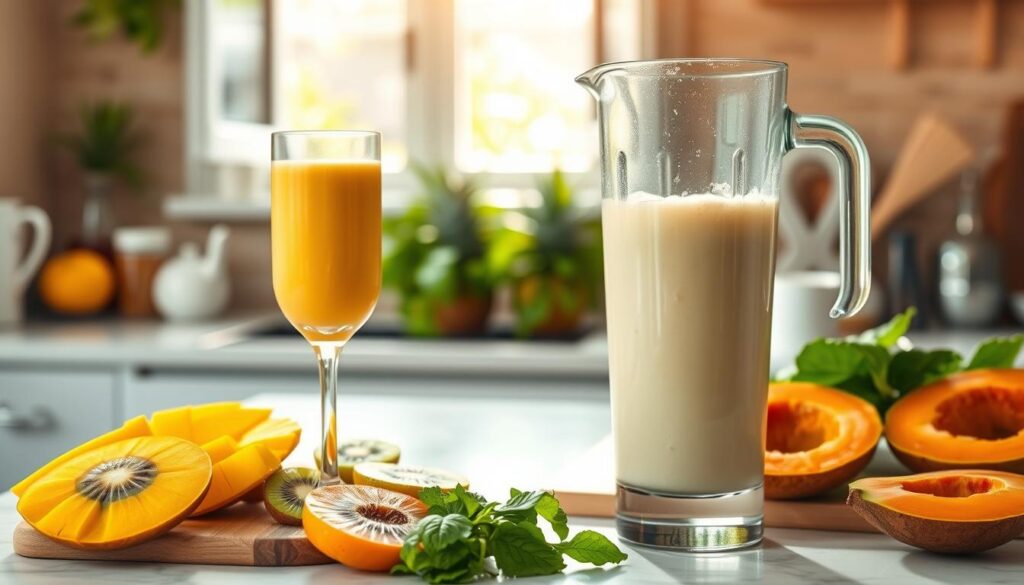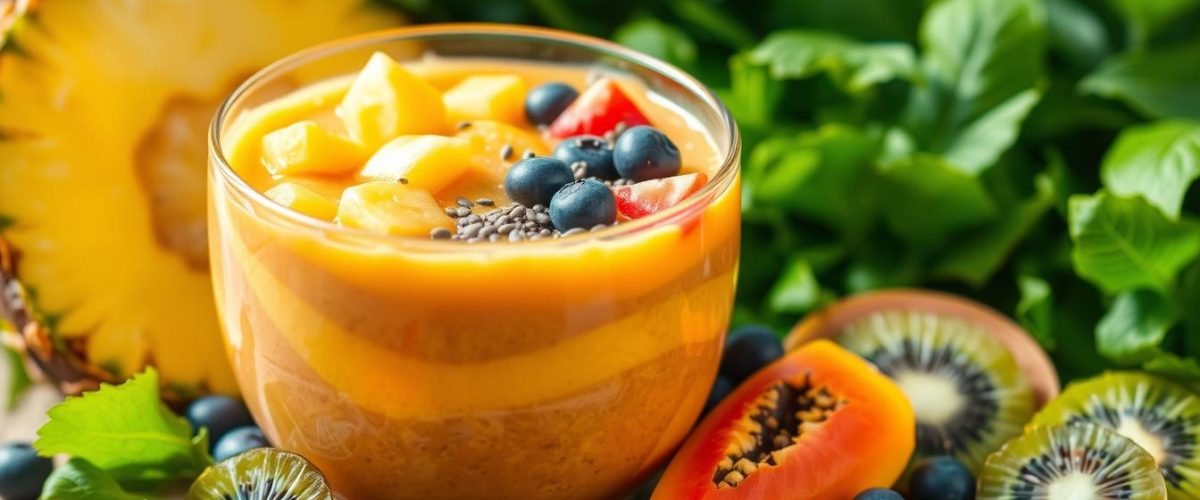Have you heard that eating anti-inflammatory foods can make you healthier? A great way to add these foods to your diet is with Tropical‑Fruit Smoothies. These smoothies are not only tasty but also good for you.
Mixing pineapple, mango, and coconut milk makes a smoothie that’s both healthy and yummy. These ingredients have anti-inflammatory properties. They can help lower body inflammation, which is linked to many chronic diseases.
Find out how adding tropical-fruit smoothies to your meals can improve your health and wellbeing.
Understanding Inflammation and Its Effects of Tropical‑Fruit Smoothies
Chronic inflammation is a silent threat that can lead to severe health complications if left unchecked. It’s your body’s natural response to injury or infection. But when it becomes chronic, it can harm your health.
What Is Inflammation?
Inflammation is a complex biological response. It’s your immune system trying to protect and heal your body. Acute inflammation is a short-term response that helps your body recover from injury or infection.
Types of Inflammation
There are two main types of inflammation: acute and chronic. Acute inflammation is a necessary response that helps your body heal from immediate threats. On the other hand, chronic inflammation persists over time and can lead to various health issues.
- Acute Inflammation: Temporary response to injury or infection.
- Chronic Inflammation: Long-term inflammation that can lead to health complications.
Health Impacts of Chronic Inflammation
Chronic inflammation has been linked to several serious health conditions. These include heart disease, diabetes, arthritis, and even certain types of cancer. The persistent inflammatory response can damage healthy tissues and organs, leading to long-term health consequences.
| Health Condition | Relation to Chronic Inflammation |
|---|---|
| Heart Disease | Increased risk due to inflammation of blood vessels. |
| Diabetes | Chronic inflammation can lead to insulin resistance. |
| Arthritis | Inflammation of the joints, leading to pain and stiffness. |
| Cancer | Chronic inflammation can contribute to tumor development. |
Understanding the causes and effects of chronic inflammation is crucial. By incorporating anti-inflammatory foods and practices into your lifestyle, you can reduce chronic inflammation. This can improve your overall well-being.
(Tropical‑Fruit Smoothies)
The Nutritional Power of Tropical‑Fruit Smoothies
Tropical fruits are packed with vitamins, antioxidants, and fiber. Adding them to your diet boosts your health and well-being.
Rich in Vitamins and Antioxidants
Mangoes, pineapples, and papayas are full of vitamins A and C. These vitamins protect your cells, reduce inflammation, and boost your immune system. Vitamin C is especially good at fighting infections.
These fruits also keep your skin healthy. Eating them can make you look younger and more vibrant.
Benefits of Fiber in Tropical‑Fruit Smoothies
Tropical fruits are great for your digestive system because of their fiber. Fiber keeps your bowels regular, prevents constipation, and helps control blood sugar. It also makes you feel full longer, which helps with weight control.
| Tropical Fruit | Fiber Content (per 100g) |
|---|---|
| Mango | 1.8g |
| Pineapple | 1.4g |
| Papaya | 1.3g |
Hydration and Its Importance
Drinking enough water is key to staying healthy, and Tropical‑Fruit Smoothies help a lot. Watermelon and cantaloupe are very watery, which helps keep you hydrated.
Proper hydration is vital for many body functions. It helps regulate temperature, transport nutrients, and remove waste. Eating hydrating fruits ensures you get enough fluids.
Key Ingredients for Your Smoothie
Your smoothie’s quality depends on the ingredients you choose. Picking the right tropical fruits is key. A good smoothie can be tasty and healthy, helping you fight inflammation.
Selecting the Right Tropical‑Fruit Smoothies
Tropical fruits are full of vitamins, antioxidants, and fiber. They make a great base for your smoothie. Some top choices include:
- Pineapple, which is high in vitamin C and manganese
- Mango, a rich source of vitamins A and C
- Papaya, which contains an enzyme called papain that aids digestion
These fruits add natural sweetness and boost your nutrient intake. They help reduce inflammation too.
Boosting Your Smoothie’s Nutritional Value
To make your smoothie even better, add leafy greens like spinach or kale. They’re full of antioxidants and support health. Healthy fats from coconut oil or avocado make your smoothie creamier and more nutritious.
Adding protein sources like Greek yogurt or plant-based powders keeps you full. It also supports muscle health.
Optional Add-Ins for Extra Benefits with Tropical‑Fruit Smoothies
Some add-ins can give your Tropical‑Fruit Smoothies extra benefits. Turmeric has curcumin, which fights inflammation. Ginger aids digestion and has anti-inflammatory effects. Moringa is full of antioxidants and supports health.
Other optional add-ins include:
- Chia seeds: Rich in omega-3 fatty acids and fiber
- Cocoa powder: Adds a chocolate flavor and is rich in antioxidants
- Nuts and seeds: Provide crunch and are a good source of healthy fats and protein
By choosing your ingredients and add-ins wisely, you can make a smoothie that’s both tasty and nutritious. It will support your health goals well.
How Tropical Fruits Target Inflammation
Tropical fruits are not just tasty; they’re also full of nutrients. They have compounds that fight inflammation, boosting your health.
Anti-Inflammatory Properties of Pineapple
Pineapple is full of bromelain, an enzyme that fights inflammation and aids digestion. Research shows it can ease arthritis and other inflammatory issues.
Bromelain works by stopping inflammatory pathways in the body. Eating pineapple often can be a fun way to fight inflammation.

(Tropical‑Fruit Smoothies)
Benefits of Mango and Papaya
Mango and papaya are tropical fruits with big anti-inflammatory benefits. Mangoes are loaded with vitamins A and C and phytochemicals that cut down oxidative stress and inflammation.
Papaya has papain, an enzyme that fights inflammation. Its antioxidants protect against free radicals, lowering disease risk.
The Role of Coconut in Inflammation
Coconut is famous for its anti-inflammatory effects, thanks to lauric acid. Lauric acid fights microbes and inflammation, reducing body inflammation.
Adding coconut to your smoothies boosts their anti-inflammatory powers. Use coconut milk or shredded coconut for a health boost.
| Tropical Fruit | Key Anti-Inflammatory Compound | Health Benefit |
|---|---|---|
| Pineapple | Bromelain | Reduces inflammation, improves digestion |
| Mango | Vitamins A and C, Phytochemicals | Reduces oxidative stress, inflammation |
| Papaya | Papain | Reduces inflammation, aids digestion |
| Coconut | Lauric Acid | Antimicrobial, anti-inflammatory effects |
Preparing Your Tropical Tropical‑Fruit Smoothies
To make the best tropical fruit smoothies, start with the right steps. You need to know about the tools, the texture you want, and the recipes to use.
Choosing the Best Blender
A good blender is key for a great smoothie. Look for a blender with strong power, speed, and durable blades. It should handle frozen fruits and ice well. Brands like Vitamix and Blendtec offer top-notch blenders for smooth textures.
Tips for Perfect Consistency
Getting the perfect consistency is important. Adjust the liquid, add more frozen fruit, or change the ingredient order. For a thicker smoothie, add more frozen fruit or protein powder. For a thinner one, add more coconut water or juice.
- Add ingredients in the right order: liquids first, then soft ingredients, and finally frozen items.
- Use the right ratio of frozen to fresh ingredients to achieve your desired consistency.
- Experiment with different types of milk or yogurt to change the texture.
Recipes for Delicious Smoothies (Tropical‑Fruit Smoothies)
Here are a few delicious smoothie recipes to try:
- Mango Pineapple Delight: Mix 1 cup frozen mango, 1/2 cup frozen pineapple, 1/2 cup coconut water, and a handful of spinach for a refreshing and healthy smoothie.
- Papaya Coconut Refresher: Blend 1 cup frozen papaya, 1/4 cup coconut milk, 1 tablespoon chia seeds, and a squeeze of lime juice for a creamy and invigorating drink.
Don’t be afraid to mix different tropical fruits, nuts, and seeds. The goal is to have fun and be creative with your smoothie making.
Incorporating Smoothies into Your Diet
To get the most out of your tropical fruit smoothies, it’s key to add them to your diet wisely. Decide how often and when you’ll have them. Also, pair them with meals and adjust your diet for better health.
Frequency and Timing for Best Results (Tropical‑Fruit Smoothies)
How often you have smoothies depends on your health goals and diet needs. For many, one or two smoothies a day is good. The morning is best for a smoothie as breakfast or a post-workout snack.
Some like to have a smoothie mid-morning or afternoon to fight hunger and boost energy. Try different times to see what fits your life and health goals.

(Tropical‑Fruit Smoothies)
Pairing Smoothies with Other Meals
Having smoothies with meals can make them more nutritious and keep you full longer. For example, a smoothie with protein, healthy fats, and carbs gives you a balanced diet.
A famous nutritionist says, “A balanced diet with whole foods and smoothies can greatly improve health and well-being.”
Adjusting Your Diet for Better Health with Tropical‑Fruit Smoothies
To make smoothies a part of your diet, think about your dietary needs. Make sure your smoothies match your meals. Also, watch how your body reacts and adjust as needed.
| Dietary Adjustment | Benefit |
|---|---|
| Increasing fiber intake through smoothies | Improved digestion and satiety |
| Adding protein-rich ingredients | Enhanced muscle recovery and satisfaction |
| Incorporating healthy fats | Better nutrient absorption and energy |
By adding smoothies to your diet thoughtfully, you can enjoy tropical fruit benefits while improving your health and well-being.
(Tropical‑Fruit Smoothies)
Common Mistakes to Avoid
To get the most out of your tropical fruit smoothies, stay away from common errors. Smoothies can be great for your health, but mistakes can upset the balance of nutrients or add too much sugar.
Overloading on Sugar
One big mistake is adding too much fruit, which can make your smoothie very sweet. Natural sugars are better than refined ones, but too much can still harm your health. It might lead to weight gain or worsen conditions like diabetes.
To fix this, limit high-sugar fruits like mango or pineapple to one per smoothie. Mix them with fruits that have less sugar, like berries or citrus fruits.
Neglecting Balance in Ingredients
A good smoothie has a mix of nutrients, including proteins, fats, and carbs. Skipping this balance can make your smoothie too thin or too thick and calorie-heavy.
Try to mix it up with different ingredients. Add protein sources like Greek yogurt or nuts, healthy fats like chia seeds or avocado, and a variety of fruits and veggies for fiber and vitamins.
(Tropical‑Fruit Smoothies)
Ignoring Portion Sizes
It’s easy to overdo it with smoothies because they’re healthy. But, they can be high in calories, which can cause weight gain if you drink too much.
Watch your portion sizes and keep your smoothies around 300-400 calories. Use the table below to estimate calories in common smoothie ingredients:
| Ingredient | Approximate Calories per Serving |
|---|---|
| 1 cup frozen mango | 100 calories |
| 1/2 cup Greek yogurt | 50 calories |
| 1 tablespoon chia seeds | 60 calories |
| 1 cup unsweetened almond milk | 30 calories |
| 1/2 avocado | 110 calories |
By avoiding these common mistakes, you can enjoy your tropical fruit smoothies fully. This way, you keep your diet healthy and balanced.
Real-Life Success Stories
Tropical‑Fruit Smoothies have helped many people. They reduce inflammation and boost health. These drinks are packed with nutrients, making them a natural way to feel better.
Testimonials from Health Enthusiasts
Many health enthusiasts love tropical fruit smoothies. Sarah Johnson, a fitness lover, says,
‘Incorporating tropical fruit smoothies into my diet has significantly reduced my post-workout inflammation.’
Nutritionist Endorsements
Nutritionists also support Tropical‑Fruit Smoothies. Dr. Maria Rodriguez, a well-known nutritionist, says,
‘Tropical fruits are rich in antioxidants and vitamins that are crucial for reducing inflammation.’
Her words are based on research and real-life success.
Personal Experiences with Smoothies
Many people have shared their good experiences with tropical fruit smoothies. John Davis, for example, noticed more energy and less inflammation after drinking them. His story shows the benefits of adding these smoothies to your diet.
Looking at these success stories, it’s clear that tropical fruit smoothies are great for a healthy lifestyle. They can help reduce inflammation and increase nutrient intake. Hearing about others’ experiences can inspire and guide you.
Conclusion: Your Path to Better Health with Tropical‑Fruit Smoothies
Adding tropical fruit smoothies to your diet can bring many health benefits. They help reduce inflammation and boost your overall well-being. Tropical fruits like pineapple, mango, and papaya are packed with vitamins, antioxidants, and fiber.
Maximizing the Benefits
To get the most out of smoothies, try different tropical fruits. Find the combinations that you enjoy the most. Enjoying these smoothies regularly is a big step towards better health.
Next Steps for a Healthier You
Now you know the benefits of tropical fruit smoothies. Start by adding one or two smoothies to your week. As you get used to making them, you can make them more often. This will help you enjoy the benefits and improve your health.



4 Responses